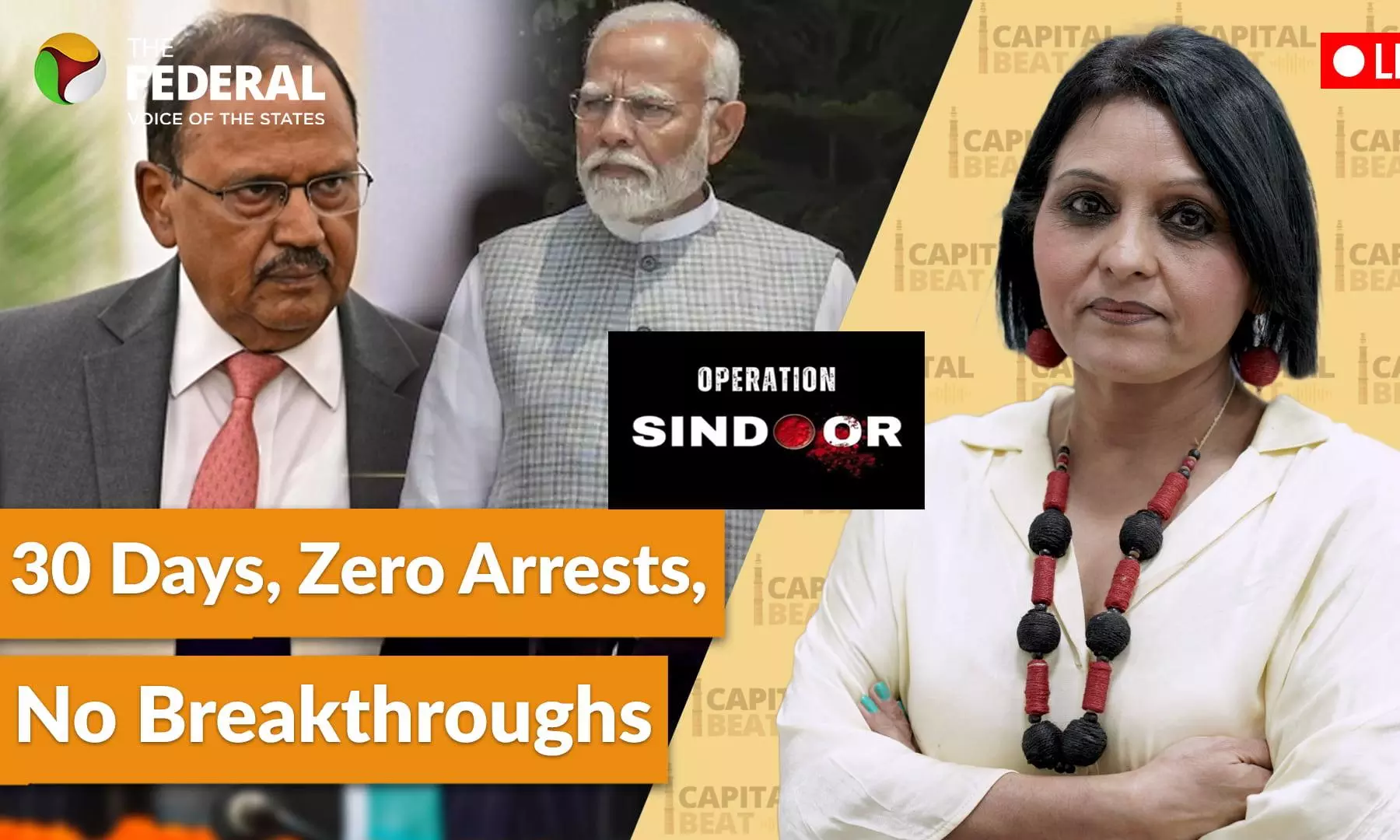
One month of Pahalgam: ‘India scored military victory, lost battle of narratives’ | Capital Beat
Experts note that while the perpetrators of the attack haven't been caught, India has been left isolated on the diplomatic front with no neighbour backing it

A month after the Pahalgam massacre in which 26 civilians lost their lives, Capital Beat delves into the strategic, diplomatic, and security repercussions of Operation Sindoor. Retired Army major general Ashok Mehta, former wing commander and Congress spokesperson Anuma Acharya, and on-ground reporters analyse whether India has managed to counter both the terrorist threat and global narrative warfare.
Unanswered questions
In the aftermath of the brutal April 22 terror attack in Pahalgam, Jammu and Kashmir, India’s strategic and investigative machinery appears to be trailing behind. As host Neelu Vyas pointed out, one month later, “the hunt is still on” for the perpetrators, with no breakthroughs from the National Investigation Agency (NIA).
Capital Beat: ‘Centre’s anti-terror team will be met with cold formality abroad’
Mehta minced no words in criticising the lack of outcomes. “For the first time after any big terrorist attack, the attackers haven’t been accounted for—no trace, no arrests.”
He further noted the paradox of India's internal security approach: “While Pakistan promoted Asim Munir to field marshal, we extended our IB chief’s term. But what is being done?”
Two encounters have occurred in south Kashmir’s Shopian and Kishtwar, but these seem unconnected to the Pahalgam culprits. “Despite a muscular counter-terrorism policy, nothing concrete has emerged,” said Mehta.
Mixed military outcomes
While India’s tri-forces showcased coordination, Mehta emphasised that operational wins may not translate into long-term advantage. “We’ve scored a moral, political, and military victory, but we’ve completely lost the battle of narratives—the information war.”
He highlighted how Pakistan, aided by China, is adept at “grey zone warfare,” whereas India has struggled to maintain narrative dominance. “Diplomacy couldn’t keep pace with the swift military strikes,” he said.
Also read: 'Relations are built on...': India's warning to Turkey over Pak ties
On the issue of losses, Mehta revealed a gap in public accountability: “Human casualties have been declared, but not the combat losses—equipment, aircraft, money.”
Kashmir on alert
The situation on the ground remains fragile. As Amarnath Yatra and Kheer Bhawani Mela approach, the region is tense. “There’s a semblance of normalcy, but not full recovery,” a local journalist noted. Markets in Jammu shut early, and tourism is down 60 per cent.
Fear still lingers. “Tourists were profiled and killed on religious lines. Amarnath Yatra, being a Hindu pilgrimage, is at risk,” the journalist warned. Unified command meetings are underway to prepare, but confidence remains shaky.
Despite claims of peace after Article 370’s abrogation, recent violence has reignited old fears. “The government prematurely declared terrorism a thing of the past. That claim has now fallen flat,” the journalist added.
Also read: ‘When Sindoor turns into barood…’: PM Modi’s top 6 quotes in Rajasthan rally
Opposition critique
Congress spokesperson Acharya dismissed the government’s response as cosmetic. “Diplomacy has failed miserably. These multi-party delegations are just for optics,” she said, criticising Modi’s rhetoric and the lack of action.
She accused the government of “headline management” rather than meaningful action. “Not only were the terrorists not caught, but no strategy was shared. Parliament wasn’t convened. Nothing,” Acharya said.
The Congress has also taken issue with what it claims is a narrative control via mass campaigns. “Lakhs of hoardings, WhatsApp forwards—but people have seen through the optics,” she asserted.
Global diplomacy falters
Mehta reiterated India’s isolation on the diplomatic front. “Only Israel has come out in support of India’s actions. No other country in the neighbourhood has backed us unequivocally.”
He highlighted India’s silence on Gaza and questioned the government’s evolving stance from 'Buddha to Yuddha'. As Pakistan prepares to chair the UN Security Council in July, Mehta warned: “They will push Kashmir back into the international arena.”
Also read: Amid Trump claim, Jaishankar asserts that India, Pak directly negotiated truce
Pakistan’s Prime Minister has already listed Kashmir, terrorism, trade, and water as points for dialogue. India, however, insists talks will only cover terrorism and Pakistan-occupied Kashmir.
Narratives, optics, and reality
Despite the Indian government’s claims of restraint and precision during Operation Sindoor, public perception appears skeptical. “We told Pakistan we’d only target terror camps, not military installations. But the narrative seems to have slipped,” said Mehta.
As the dust settles on one of the most brutal terror attacks in recent times, unanswered questions persist: Who were the attackers? What were India’s real losses? And has the government done enough to secure both its territory and its global standing?
Also read: Three teams to leave with India’s anti-terror message today; here’s their brief
The content above has been generated using a fine-tuned AI model. To ensure accuracy, quality, and editorial integrity, we employ a Human-In-The-Loop (HITL) process. While AI assists in creating the initial draft, our experienced editorial team carefully reviews, edits, and refines the content before publication. At The Federal, we combine the efficiency of AI with the expertise of human editors to deliver reliable and insightful journalism.

